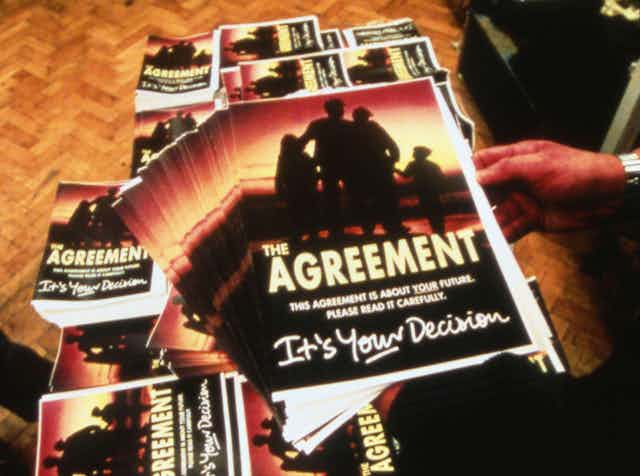The Good Friday Agreement ended a conflict that claimed more than 3,500 lives between 1968 and 1998. It is estimated that one-third of the adult population in Northern Ireland has been directly affected by bereavement, physical injury or trauma.
Peace agreements often now include provisions (such as truth commissions) to deal with the legacy of past conflict. Addressing the rights and needs of victims, these mechanisms seek to balance competing demands for truth, justice, accountability and reconciliation. The Good Friday Agreement controversially provided for the release of all paramilitary prisoners who had served two years and agreed to the peace process. But broader legacy issues were deemed a bridge too far.
The “moment” of political agreement presents a unique opportunity to confront the horrors of past conflict and violence. As a lawyer interviewed in the course of recent research I carried out with colleagues on the South African transition noted:
The first five or ten years is a great window of opportunity in every way … [you have to] use that space because it all really closes down.
The rights and needs of victims were not central to the Good Friday Agreement negotiations. A 1998 report by Northern Ireland victims commissioner Sir Kenneth Bloomfield proposed practical measures to deal with their pain and suffering – but, in many respects, the window of opportunity was lost. In the decades following the agreement there was pressure from the European Court of Human Rights to deal effectively with Troubles-related offences and deaths. In response, successive UK governments commissioned a series of initiatives to explore how everyone involved might holistically deal with legacy issues.
But it wasn’t until 2014, after multiple false starts, that the British and Irish governments and four of the five main political parties in Northern Ireland finally signed up to the Stormont House Agreement. This proposed an independent historical investigations unit to look at outstanding cases relating to deaths during the Troubles and an information recovery body that would enable people to seek and privately receive (via interlocutors) information about the Troubles-related deaths of their relatives. The information provided to this body would not be admissible in legal proceedings. There was also provision for a major oral history archive and an implementation group to lead on broader reconciliation efforts.
Backtracking on the GFA
Following years of delay, the UK government finally committed to legislating for the Stormont House Agreement legacy mechanisms in 2020. But in a dramatic about-turn just weeks later, then prime minister Boris Johnson sacked his secretary of state for Northern Ireland and scrapped the Stormont House Agreement, instead pushing for a sweeping amnesty for Troubles-related crimes. This was fuelled by a misleading narrative that there has been a “witch-hunt” against British army veterans who served in Northern Ireland (only one veteran has been successfully prosecuted since 1998).
For the past year, the UK government has been moving forward with the Northern Ireland Troubles (legacy and reconciliation) bill. This fundamentally undermines the Good Friday Agreement. The incorporation of the European Convention on Human Rights (ECHR) into domestic Northern Irish law was a cornerstone of the GFA. This bill significantly limits the ability of people in Northern Ireland to challenge alleged breaches of the ECHR by closing access to the criminal, civil and coronial courts for Troubles-related cases.
The GFA also committed the UK government to “devolve policing and justice issues” to Northern Ireland, as indeed occurred in 2010. This bill now seeks to unravel key elements of the devolution of policing and justice. It proposes to grant people accused of serious Troubles-related crimes conditional immunity from prosecution, setting the conditional bar so low as to make that immunity practically guaranteed. Many regard this as a thinly veiled attempt to ensure that state actors are not held to account for their actions in Northern Ireland.
The bill is opposed by Northern Ireland’s victims, the Council of Europe, UN special rapporteurs, the Northern Ireland Human Rights Commission, the Irish government and all political parties in Northern Ireland. The government has suggested that the existing legal system is not delivering for victims. The legislation thus proposes setting up a commission to help victims recover information, but the proposed body lacks the legal powers to access the kind of information necessary to enable people to find out what happened during the Troubles.
All accept that successful prosecutions in Troubles-related cases will now be few and far between (and nobody can serve more than two years for Troubles-related offences). The key point is that legal investigations have been increasingly successful in recent years in delivering information to families and exposing embarrassing details concerning state involvement in past human rights violations.
An anniversary and a time for action
The implementation of the Good Friday Agreement has, in recent years, been significantly undermined by the government’s focus on matters English. There has been a notable determination that British army veterans should not be prosecuted, or indeed even properly investigated for conflict-era offences, and indifference about the implications of such a policy in Northern Ireland and its compatibility with international human rights law.
Ireland’s taoiseach, Leo Varadkar, has indicated that the Irish government could not rule out taking an interstate case to Strasbourg if the UK government makes its bill law as they believe it contravenes the European Convention on Human Rights.
In the meantime, victims are being retraumatised by the ongoing denial of their right to find out the truth about what happened to their loved ones and to see those responsible held to account.
The EU and the US administration played a crucial role in securing the peace agreement in 1998. The best efforts of Dublin, Brussels and the Biden administration are now required to prevent it unravelling.

